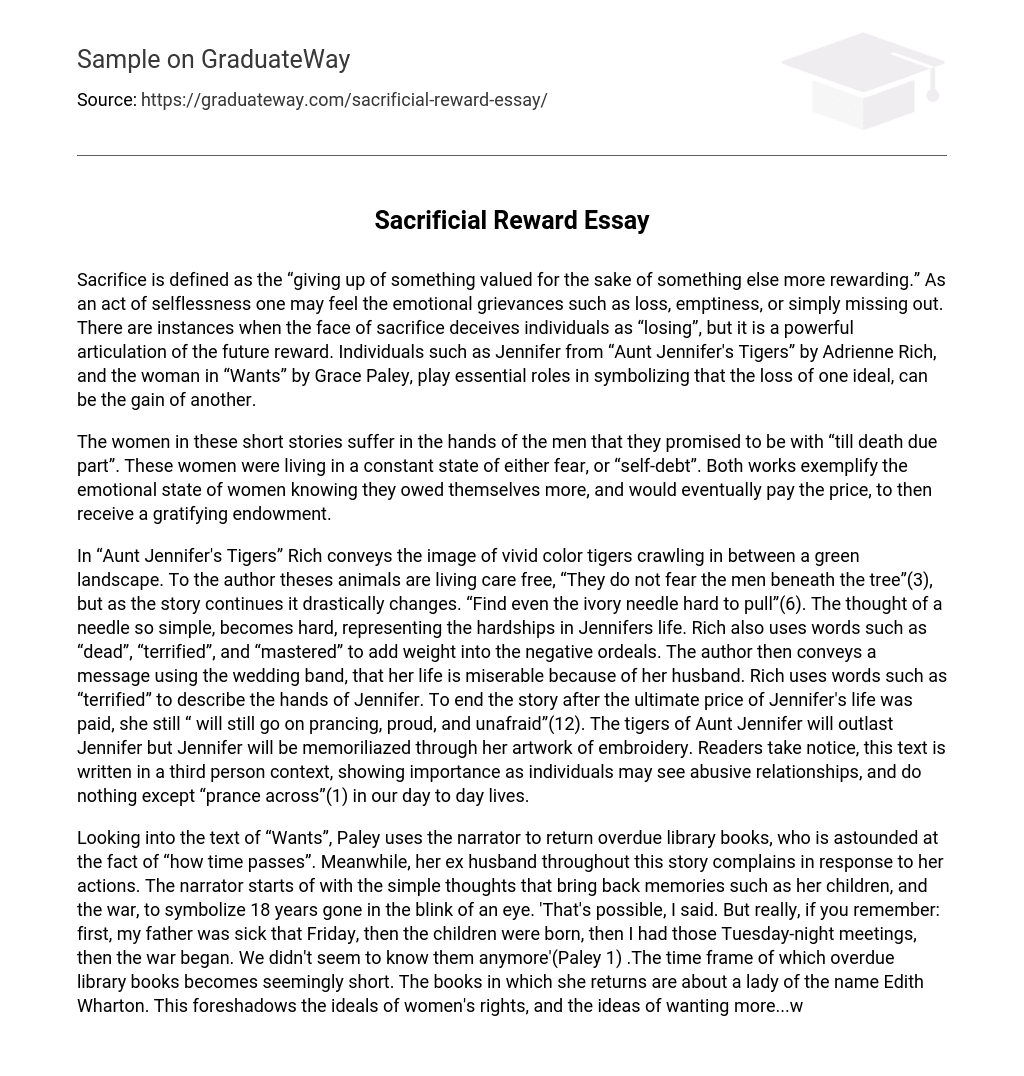Sacrifice is defined as the “giving up of something valued for the sake of something else more rewarding.” As an act of selflessness one may feel the emotional grievances such as loss, emptiness, or simply missing out. There are instances when the face of sacrifice deceives individuals as “losing”, but it is a powerful articulation of the future reward. Individuals such as Jennifer from “Aunt Jennifer’s Tigers” by Adrienne Rich, and the woman in “Wants” by Grace Paley, play essential roles in symbolizing that the loss of one ideal, can be the gain of another.
The women in these short stories suffer in the hands of the men that they promised to be with “till death due part”. These women were living in a constant state of either fear, or “self-debt”. Both works exemplify the emotional state of women knowing they owed themselves more, and would eventually pay the price, to then receive a gratifying endowment.
In “Aunt Jennifer’s Tigers” Rich conveys the image of vivid color tigers crawling in between a green landscape. To the author theses animals are living care free, “They do not fear the men beneath the tree”(3), but as the story continues it drastically changes. “Find even the ivory needle hard to pull”(6). The thought of a needle so simple, becomes hard, representing the hardships in Jennifers life. Rich also uses words such as “dead”, “terrified”, and “mastered” to add weight into the negative ordeals. The author then conveys a message using the wedding band, that her life is miserable because of her husband. Rich uses words such as “terrified” to describe the hands of Jennifer. To end the story after the ultimate price of Jennifer’s life was paid, she still “ will still go on prancing, proud, and unafraid”(12). The tigers of Aunt Jennifer will outlast Jennifer but Jennifer will be memoriliazed through her artwork of embroidery. Readers take notice, this text is written in a third person context, showing importance as individuals may see abusive relationships, and do nothing except “prance across”(1) in our day to day lives.
Looking into the text of “Wants”, Paley uses the narrator to return overdue library books, who is astounded at the fact of “how time passes”. Meanwhile, her ex husband throughout this story complains in response to her actions. The narrator starts of with the simple thoughts that bring back memories such as her children, and the war, to symbolize 18 years gone in the blink of an eye. ‘That’s possible, I said. But really, if you remember: first, my father was sick that Friday, then the children were born, then I had those Tuesday-night meetings, then the war began. We didn’t seem to know them anymore'(Paley 1) .The time frame of which overdue library books becomes seemingly short. The books in which she returns are about a lady of the name Edith Wharton. This foreshadows the ideals of women’s rights, and the ideas of wanting more…wanting something better. This foreshadows into the ex-husband stating that he is finally getting the sailboat he always wanted, complaining to the narrator she ‘didn’t want anything.’ He then tells her, ‘As for you, it’s too late. You’ll always want nothing”(Paley 2), leaving the narrator to ponder.
She realizes is that she does want something, but not the tangible things of this earth but rather ‘I want, for instance, to be a different person. I want to be the woman who brings these two books back in two weeks. I want to be the effective citizen who changes the school system and addresses the Board of Estimate on the troubles of this dear urban center. […] I wanted to have been married forever to one person, my ex-husband or my present one”(Paley 3).That of which is intangible, meanwhile to the understanding of the narrator, much of this is unattainable. While it may sound cliche to want to be a ‘different person,’ there is still hope that she can develop as the person she wants to be. The price of the books is eventually repaid, and immediately she receives gratitude from the librarian. The librarian sees some of the new attributes of which she wishes to be, while the ex husband, only sees her faults. Returning library books is, of course, mostly symbolic. It’s a bit easier than, for instance, becoming an ‘effective citizen”(Paley 3). Just as the ex-husband puts the down payment on the sailboat, the thing he wants, the narrator’s returning the library books is a down payment on becoming the sort of person she wants to be. This text is written in first person, adding to the importance of “I”. This makes the reader question the personal values and views of themselves. They can make the needed changes in their lives as their is still plenty of life to live.
In conclusion, the role of women in society has often been as a status of personal gain for men. Women in these stories knew that they owed themselves more, and would eventually pay the price, to then receive their gratifying endowment. These texts exemplify these lessons of self accomplishment and identity. In “Wants” readers see this through a self realization, “Aunt Jennifer’s Tigers” we see this through the symbolism of Jennifer’s artwork. Sometimes it takes an ultimate sacrifice in order for one to see the state of which they are living. Characters can chose to decide “Am I going to stay where I’m at?” or “Maybe it is not the situation that needs to change, but rather myself.”





